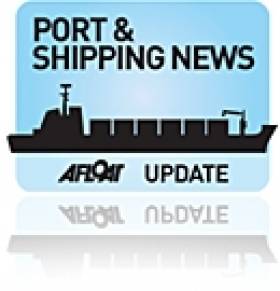Displaying items by tag: 30th Year Reunion
Seafarers & Shore-Staff Recount Tales at Irish Shipping Ltd Reunion
#ISL30thReunion- Irish Shipping Ltd, the state-owned deep-sea shipping company that was liquidated 30 years ago was marked by former employees attending a reunion that was held on Friday in the Conrad Hotel, Dublin, writes Jehan Ashmore.
In recognition of the date's significance (14 November 1984) in Irish maritime affairs, the reunion attracted around 80 former seafarers and shore-staff. Despite the rather inclement weather they gathered at the city-centre venue to commemorate the event.
The origins of ISL stem from the outbreak of WW2 in 1939 which led to the Irish Government in 1941 to incorporate the state-shipping company. It was realised the stark reality of not having an Irish flagged fleet to meet the strategic importance of ensuring critical food and cargoes supplies to our dependent island. To distinguish Ireland's neutral position, the ships had the Irish flag and 'Eire' painted on the hulls.
According to Gerry McGovern, the reunion was attended by many Captains and stealing the show was Able Seaman, Desmond Brannigan who sailed in the Irish Poplar in 1941. A young photographer at the event asked Des, "Did the ship have the Irish colours painted on the side?" "It sure did" said Des, "we were bringing food to this country while fellows were trying to kill us, but we made it". Des is one of the last to brave the North Atlantic on an Irish flag ship during the war.
In 1942 the Irish Pine was sunk by U-Boat torpedo with the loss of all 33 crew members. A year later, Irish Oak was also a victim yet fortunately all crew were saved by fleet-mate Irish Plane and taken ashore to Cobh. Asides the stricken ISL ships, there were an additional 14 vessels from the Irish-registry lost during WW2.
Returning to the reunion, a mix of those who served a career at sea from throughout the various departments of deck, engine and catering chatted along with shore-staff office personnel. It was a night to remember, with lots of sea stories being told and some from a time long past!
Also in attendance were the four Wexford authors who produced the excellent book, 'Irish Shipping Ltd- A Fleet History'. The publication traces all the vessels of the grey-hulled fleet that reached the four corners of the world and proudly under the Irish flag!
ISL's fleet numbered 51 during the course of the company's 43 year existence. They were given a naming theme, where the prefix 'Irish' was followed by a name of a tree species. Examples, been the Irish Ash (painting by Kenneth King), Larch and Willow. There was the exception with two 'Star' vessels that were built for long-term charter.
As the company spanned several decades, most of these ship names were repeated and became well known in Irish shipping circles and in ports throughout foreign shores.
As previously referred, the Irish Willow (3) was a general cargoship of 1,743 tonnes built in Scotland and her sister Irish Fir was built at the former Liffey Dockyard Ltd. The current related business albeit in the form of ship-repair and maintenance firm Dublin Graving Docks Ltd is located nearby to the site of the old shipyard in Alexandra Basin.
The dry dock is currently occupied by an Arklow Shipping Ltd vessel, the dry-cargo bulker Arklow Willow (click report and for photo), whose name is aptly similar to ISL's vessel tree naming theme.
She is the only ASL ship to feature a 'tree' name from a 45-strong fleet that is in the majority under the Irish tricolour with the balance Dutch-flagged.
























































